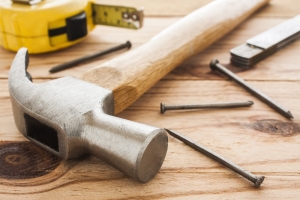 Tools are a common part of most households. Whether stored in the garage for special occasions, kept in the house for regular projects, or used daily, we all from time to time will find ourselves using hand tools. As common as they are, hand tools are responsible for accidents and injuries in many. Often, it takes a serious accident to occur before safety steps are taken to prevent them. The reality is, many just don’t think of it until it’s too late. So let’s look at safety precautions of and how you can take steps now that can save you an injury in the future.
Tools are a common part of most households. Whether stored in the garage for special occasions, kept in the house for regular projects, or used daily, we all from time to time will find ourselves using hand tools. As common as they are, hand tools are responsible for accidents and injuries in many. Often, it takes a serious accident to occur before safety steps are taken to prevent them. The reality is, many just don’t think of it until it’s too late. So let’s look at safety precautions of and how you can take steps now that can save you an injury in the future.
According to OSHA: “The greatest hazards posed by hand tools result from misuse and improper maintenance.” Learning to use tools properly, and knowing what maintenance is required with your tools is a large precaution you can take. The first rule of tools is to use it for its designed purpose. Using a tool for a purpose for which it was not created can not only damage your tool, but it can be hazardous. Also, replace tools as necessary. If a handle is loose, using it may result in the head of the tool flying off. If it doesn’t hit someone nearby, it can damage your property. If you notice your tools are loose, sprung, or even dulled, replace it. A few extra dollars now can potentially save on medical bills later.
The next precaution you should take is safety equipment. While most know to use these with power tools, the hand tools are often forgotten. Safety goggles, gloves, hard hats, and steel-toed shoes or boots are a worthwhile if not necessary investment for those who use tools on a semi-regular basis. If you do not have these, and rarely use tools, pick up at a minimum safety goggles and gloves, which can be purchased at your local hardware store inexpensively. Also wear strong shoes, to protect your feet from anything that may drop.
When working with tools, make sure you are in a safe environment. Hammers, screwdrivers, and many other tools all require an exertion of force. As such, work on a floor that is clean, free of debris, and has strong traction so that you will not slip. Do not work near anything flammable, even if you have spark-resistant tools.
Overall, paying attention to your environment and taking small steps can make the difference between a job well-done and a trip to the hospital. While it may seem like it won’t happen to you, thousands of injuries happen every year due to hand and power tools. Don’t be one of them! If you have a job that is beyond your skill set, hire a professional to do it for you. Safety precautions will help; however, even with the proper tools and gear, doing a job too difficult is hazardous, regardless of the precautions taken. Remember that no job is so important that it is worth a trip to the hospital. You can prevent this by knowing your capabilities, using common sense and proper safety procedures.
No comments:
Post a Comment